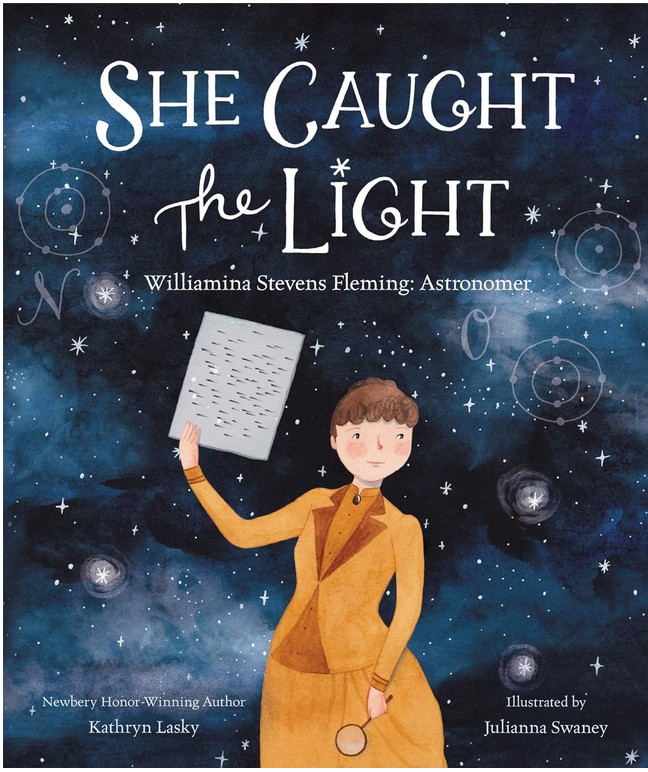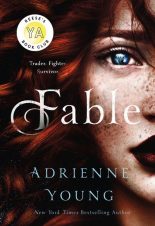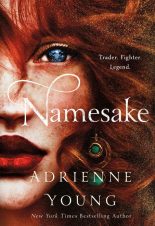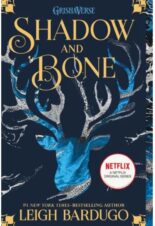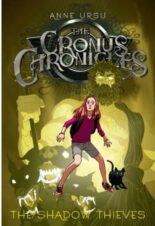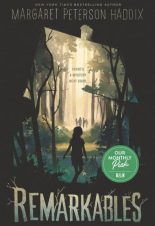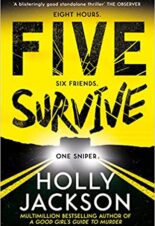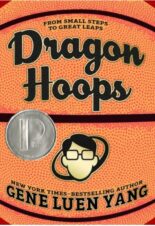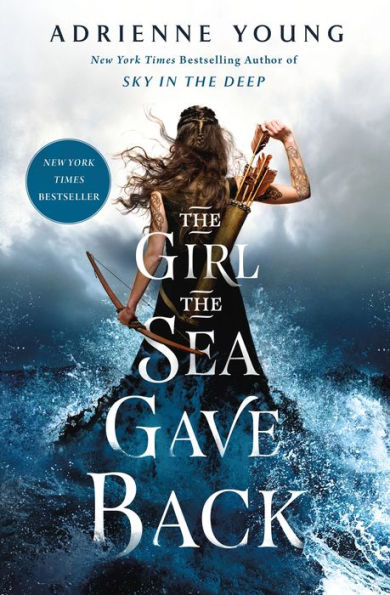
Buy This Book
“The Spinners were wise, but they weren’t always kind. Sometimes fate was a tangled knot. Sometimes it was a noose. Or a net. But sometimes, it was the rope that pulled you from the sinking deep,” Tova. –The Girl the Sea Gave Back
The Girl the Sea Gave Back
Sky and Sea #2
by Adrienne Young
AR Test
12+
Score
5.5
336
For as long as she can remember, Tova has lived among the Svell, the people who found her washed ashore as a child and use her for her gift as a Truthtongue. Her own home and clan are long-faded memories, but the sacred symbols and staves inked over every inch of her skin mark her as one who can cast the rune stones and see into the future. She has found a fragile place among those who fear her, but when two clans to the east bury their age-old blood feud and join together as one, her world is dangerously close to collapse.
For the first time in generations, the leaders of the Svell are divided. Should they maintain peace or go to war with the allied clans to protect their newfound power? When their chieftain looks to Tova to cast the stones, she sets into motion a series of events that will not only change the landscape of the mainland forever but will give her something she believed she could never have again—a home.
The Girl the Sea Gave Back is a Vikings-inspired story that is bloody and brutal. The story focuses on both Tova and Halvard’s points of view and continually jumps between the two character’s perspectives. Because the story switches points of view, there are often times when the same scene is retold from another character’s point of view. In addition to switching points of view, the story also flashes back into each character’s life. The always-changing point of view and the flashbacks makes the plot both choppy and confusing.
Although the story focuses on Tova, she is not an easy character to relate to. It is clear that the Svell dislike her; however, the reason for their fear is never explained. In the beginning, Tova seems content to follow orders and do what she is told. Although she does not like foretelling death, she doesn’t think about the consequences of her actions. Of the two characters, Halvard is more likable and interesting. He constantly doubts his worthiness but is willing to take risks to save those he loves.
In the end, The Girl the Sea Gave Back is a tale of war and fate. Long bloody battles propel the story forward, and although there is plenty of action, the characters lack development. Even though war is described in detail, it is not glorified. Instead, the story makes it clear that peace is difficult to obtain, but it is worth working towards. Halvard learns that “war is easy. It comes again and again, like waves to a shore. But I lived most of my life driven by hate, and I don’t want that for my grandchildren. Or yours.”
Although beautifully written, The Girl the Sea Gave Back lacked in world-building and will leave the reader with many unanswered questions—both about the characters and what will happen to the warring tribes. The complicated story uses graphic imagery that will leave some readers squeamish. Only strong readers who are looking for a Viking-inspired war story should read The Girl the Sea Gave Back.
Sexual Content
- One of the woman warriors “had never been motherly in nature and though she’d had several lovers through the years, she’d never had children.”
- In a brief moment alone with Tova, Halvard “took a step toward me and my heart kicked in my chest, the blood running faster through my veins. . . He leaned down, hiding me in his shadow as he pressed his lips softly to the corner of my mouth. His hands wound around my waist and for a moment, I melted into him.”
Violence
- As a child, Tova went into town, and “something hot hit my face and it wasn’t until I reached up that I realized it was blood—a prayer to their god, Eydis, to ward off whatever evil I might bring. I still remember the way it felt, rolling down my skin and soaking into the neck of my tunic.”
- When two tribes meet, the chieftain’s brother betrays him by attacking the other tribe’s chieftain. The man “suddenly reared back with the sword, launching it forward with a snap, and it sank into Espen’s stomach. The tip of its blood-soaked blade reached out behind him where it had run him through.” The two tribes fight. Halvard tries to protect his friend, Aghi. Halvard “twisted my sword in an arch around me to catch him in the gut. He tumbled to the grass and I lifted the blade before me, thick blood dripping onto the golden grass.” During the battle, Aghi is stabbed with a knife. “Aghi doubled over and it wasn’t until he hit the ground that I saw it. The handle of my knife was lodged between his ribs. I swallowed a breath as bright, sputtering blood poured from his lips and when I opened my mouth, I couldn’t hear the sound of my own screams.” As the battle continues, Halvard plunged the blade into Bekan’s heart. His head rolled back and he gasped, coughing on the blood coming up in his throat. . .” Many people die during the 12 pages of battle.
- When the Svell lose the battle, Vigdis is upset and attacks Tova. “. . . He screamed, shoving Jorrund aside and snatching up my arm. He threw me back and I hit the ground hard before he came over me, taking a handful of my hair into his fist. . .” Vigdis threatens to set Tova on fire, but she convinces him that she can still be useful so he lets her live.
- When Halvard was a child, his village was attacked and he was captured. Some of the captives were tied behind a cart. “The rope cut into the skin around his wrist and his arms ached, blood trailing up into the sleeves of his torn tunic. The woman tied beside him had fallen before the moon had even risen above the treetops and her lifeless body dragged over the ground beside him.” Halvard was saved by his brothers.
- When the Svell attack a village, Tova could hear the screams. “The light of dusk caught the glistening of wet blood on armor and the warriors passed us. . .” The man Vigdis was looking for was not in the village, so “Vigdis lifted his hand, rearing back and swinging his arm to slap me [Tova] across the face. I fell to the ground, my hands sliding over the wet soil as my mouth filled with blood.”
- Halvard thought back to his childhood when the Svell attacked his village. Most of the dead “weren’t even wearing their armor or their boots, cut down as they tried to flee in the dark. They’d been sleeping when the Svell came out of the forest and set fire to their homes. . . The bodies of people I’d known my whole life had been strewn throughout the village bright red blood staining the crisp, white snow. . .”
- At the end of the battle, friends of Halvard appear and save him when “arrows suddenly fell from the sky, arcing over my head and hitting their marks before me. Svell warriors hit the ground hard. . .”
- Halvard and his men approach the destroyed village and find “bodies still lying where they’d fallen in the fight.” Halvard sees a Svell warrior and “the blunt side of the blade caught him in the jaw. The sword fell from his hand as he tumbled backward, sliding on the stone until he rolled over the threshold, landing in the mud outside.” More Svell appear and “Asmund lifted his ax, stopping the man’s blow overhead, and slammed his closed fist into his face. . . Asmund kicked him in the chest sending him backward.” When it looks like Asmund might die, Halvard “let the knife in my other hand sink back behind my head and slung it forward, letting it fly handle over blade through the air, it hit its mark finding the flesh between his shoulder blades, and he fell face-first into the dirt at Asmund’s feet.”
- When Tova refuses to cast the stones, “a man’s face appeared over me before he bent down low, lifting me back to my feet. He didn’t even look up as a sob wracked my chest. His hand took hold of the neck of my tunic. . .” The man drags Tova to the meeting place and “he shoved me inside and I toppled forward, sliding on the ground. My palms scraped against the dry, cracked mud. . .” A man threatens to kill her if she does not read the stones.
- During the final battle there are many deaths. The battle is described over multiple chapters. “An axe flew over my [Halvard’s] head, catching a Nădhir woman behind me, and she was knocked from her feet, hitting the ground hard. I stood just in time to catch the man who’d thrown it with my blade, dropping him with one strike. . .” When a woman attacks Halvard, “I brought my axe down onto her shoulder and she fell to her knees, reaching for Fiske. He toppled backward, driving his sword up to impale the woman with it. The length of the blade shone with blood as Fiske pulled it from where it was wedged between her bones and stood, heaving.” As the battle rages, Tova joins in. “A man crashed into the mud behind me, Halvard’s knife buried in his chest. He coughed blood as I pulled it free and got back to my feet.”
- During the battle, a Svell man tries to kill Tova. “In the next instant, his knife was swinging wide, catching me in the arm. . . Before he could bring the knife down, I rolled to my side, covering my head with my hands. The blade ripped into my other arm, the edge of the iron hitting the bone, and I cried out.”
Drugs and Alcohol
- When Tova is injured, Jorrund has to stitch the injury. “Her blood shone on the needle as Jorrund pulled the thread in one long motion and tied it off. When a tear finally rolled down her cheek, he gave her another drink of the sour ale. She swallowed it down until the burn in her throat reached her chest.”
- While preparing for a battle, the Svell drink ale. “Outside, the Svell gathered around smoking fires, drunk on ale and eating what would be for some of them a last meal.”
- When a woman warrior is injured, she is given ale to help with the pain.
- During a ceremony to make Halvard the new chieftain, Halvard cuts his palm and allows the blood to pool in a cup. The other leaders then drink the blood.
- The night before the final battle, Halvard and his family drink ale.
- After the battle, some of the warriors were “drinking our winter stores of ale.”
Language
- None
Supernatural
- Tova is a Truthtongue and uses runes to tell the future. Before she drops the stones, she chants, “Eye of the gods. Give me sight.” After she throws the stones, she interprets them.
Spiritual Content
- The story revolves around the Spinners of Fate who “sat at the foot of the Tree of Urṍr weaving the density of mortals.” When Tova was born, her mother consulted the Spinners of Fate and they told her what would happen in the future.
- Different tribes believe in different gods. Although the gods’ names are mentioned, there is no explanation of how the gods are different from each other.
- Jorrund is the tribe’s healer and the “interpreter of Eydis’ will.” When he finds Tova on the beach, he thinks Tova is an omen for Eydis.
- The people believe in an afterlife and refer to it often. For example, a man’s “only child was taken to the afterlife and there she’d wait for her father until he took his last breath.” When a person dies, their body is cremated so they can travel to the afterlife.
- While preparing to meet another tribe’s leader, a man says, “we’ll make a sacrifice at dawn and ask Eydis to give us her favor.”
- People, including Tova herself, think that Tova “was a living curse. A betrayal to the Svell god. . . She was a scourge. And there were many that wanted her dead.”
- When Halvard’s friend Aghi dies, Halvard thinks that he would also like to die in the battle because “it was an end that the gods would favor.” Because Aghi’s body could not be cremated, Halvard performs a ritual. Halvard takes his knife and “I wound my fingers tightly around its blade before I slid it against my calloused palm. The hot blood pooled in the center of my hand before I pressed my finger into it, carefully writing Aghi’s name across the face of the stele.” Someone says a prayer and Halvard thinks, “It had been a long time since I’d prayed to Thora or Sigr. Not because I didn’t believe in them, but because I wasn’t sure they listened.”
- Someone tells Halvard the story of Truthtongues. When one of the god’s sisters dies and is buried, the god “swore vengeance of the Spinners for taking her life. As an offering, the Spinners gave Naṍr a mortal child with the mark on her chest. They called her the Truthtongue and promised that every woman born into her lineage would have the ability to read the runes and see into the future.”
- When the Svell were ready to attack a village, Tova tells a man, “There isn’t a single god who looks favorably upon dishonorable killing.” Tova feels guilty that she helped the soldiers find the village. She thinks, “I hadn’t planned the massacre in the glade but it was my rune cast that had justified it. . . I had always known that I was cursed. That something dark had marked me.” Tova thinks she was sent out of her village because her god didn’t want her.
- The characters often pray to their gods. For example, during a ceremony, a man shouts, “We ask you, Thora and Sigr, to entrust your people to Halvard, son of Auben.”
- Before battle, a man says a prayer. “We call upon you! We ask for your protection and your favor as we take the fjord!” The tribe’s healer then “dropped the torch at his feet and the flame caught the pitch, writhing over the grass in the paths he’d laid. . .It was an ancient symbol, the shield of the fallen Svell warrior.”
- As the warriors are praying, Tova thinks, “But there was no one I could call upon. No one who was listening. Instead, I made my plea to the Spinners. I asked for their forgiveness. I begged for their help.”
- When Tova offers to cast the stones for Halvard, he refuses by saying, “I don’t want to know. I trust the gods.”
- The night before the final battle, Tova doesn’t pray to a god. “Instead, I prayed to the woman in my vision.” Later, she discovers that the woman in the vision was her mother.
- When Tova meets her mother, her mother tells her, “The Spinners brought us here to find you. But we don’t know yet what other purpose they have for us. We won’t know until they tell us. . . Mortals and gods cannot be trusted to obey the warnings of the Spinners.”
“The Spinners were wise, but they weren’t always kind. Sometimes fate was a tangled knot. Sometimes it was a noose. Or a net. But sometimes, it was the rope that pulled you from the sinking deep,” Tova. –The Girl the Sea Gave Back
Latest Reviews

Goodbye Days

Medusa

Simone Biles Vs. Nadia Comaneci: Who Would Win?

A Manatee Calf Grows Up
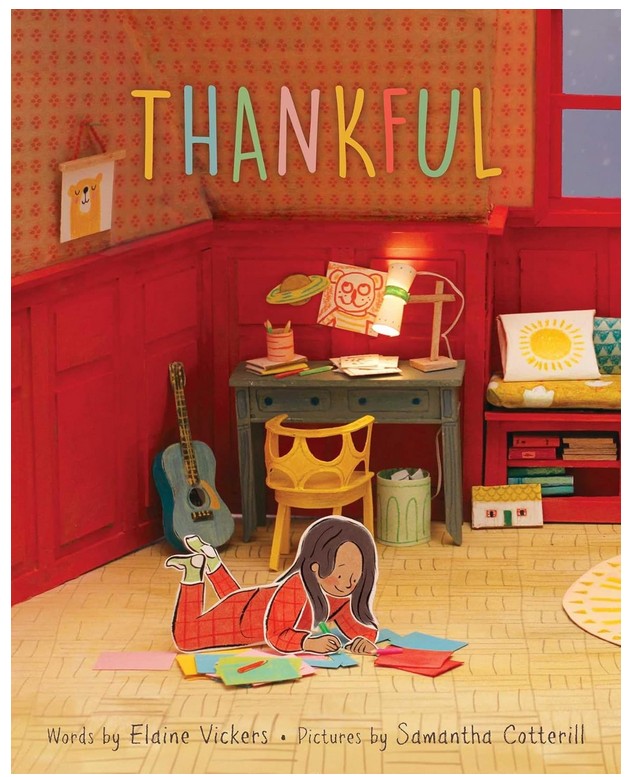
Thankful
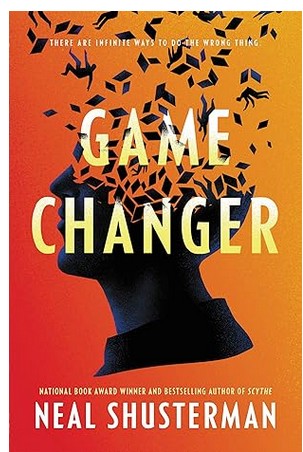
Game Changer
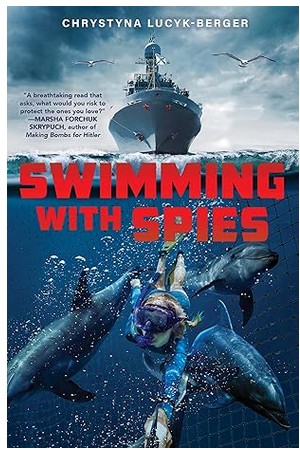
Swimming with Spies
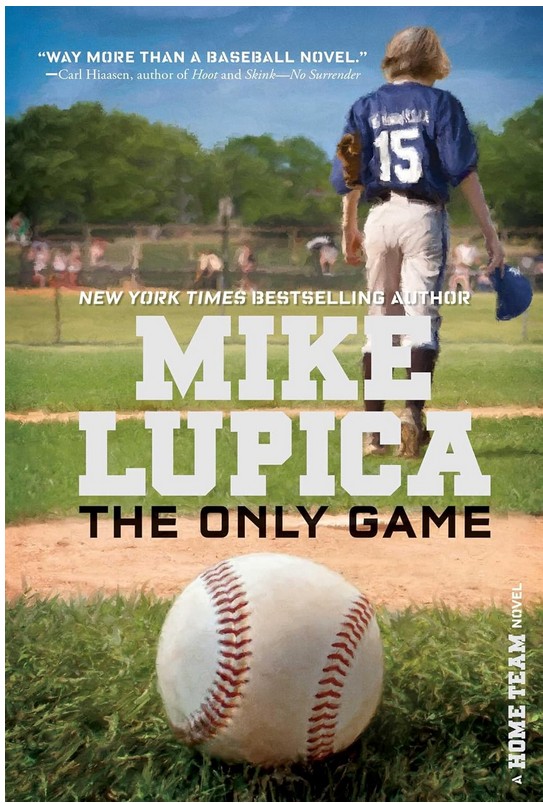
The Only Game
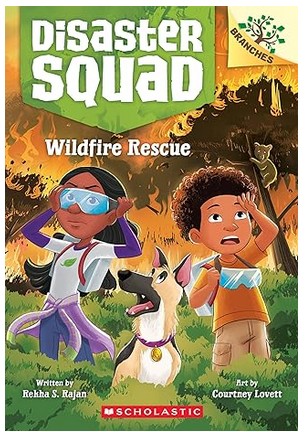
Wildfire Rescue
